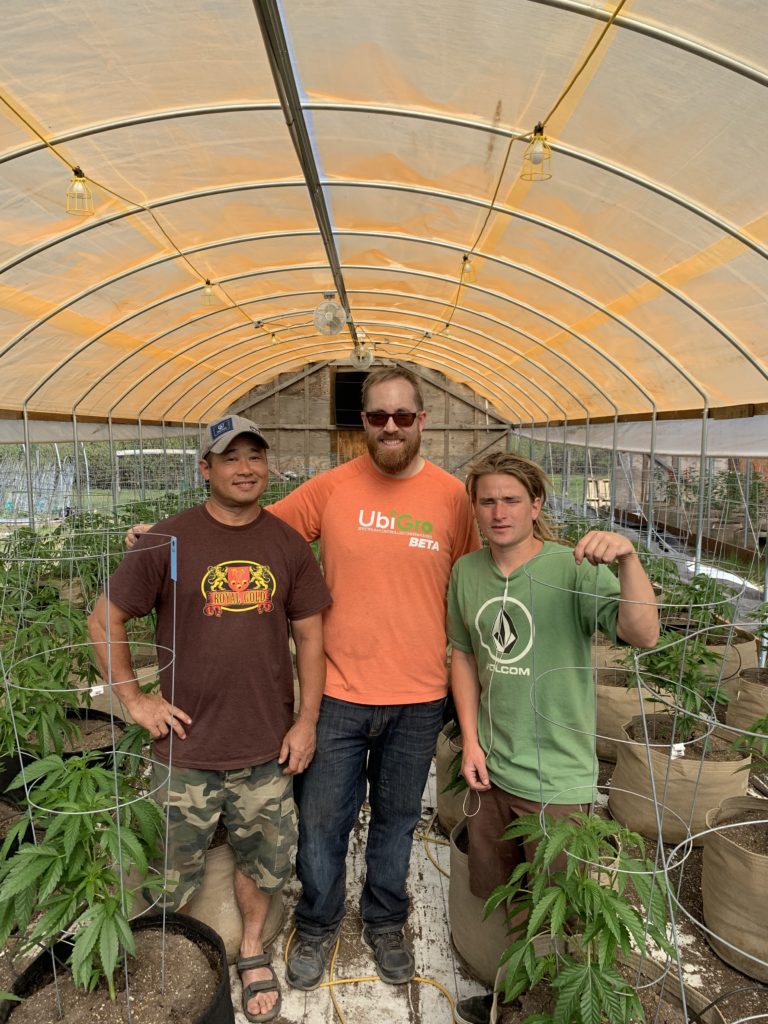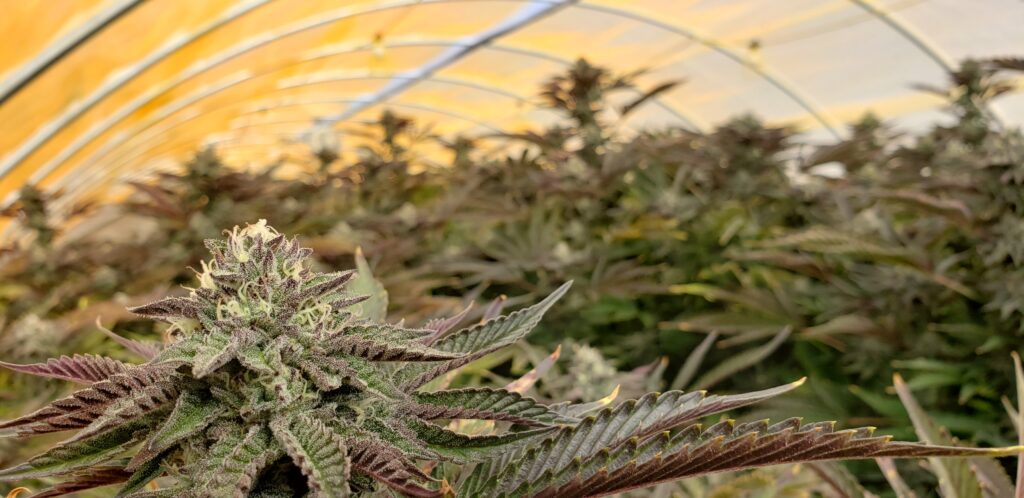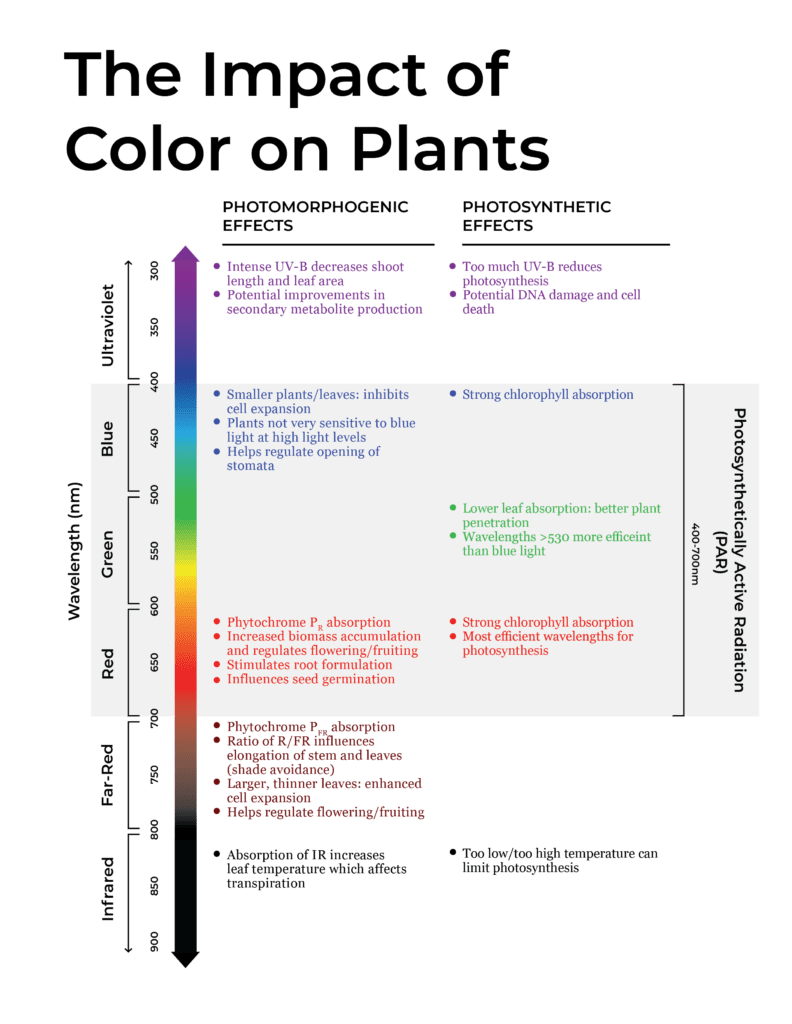+16% Boost in Cannabis Production
AT A GLANCE
- Results
- Crop
- Farm
- Location
After ten weeks of cultivation, dry, trimmed harvest weights were reported. Dry yield measurements showed an additional 7.5 lbs of product harvested from plants under UbiGro, equivalent to a +16.0% increase in total dry yield.
248 Hybrid Cannabis Plants with two different strains: Wedding Cake and Ice Cream Cake. Both are broad leaf Indica-dominant hybrids
Little Hill Cultivators
Over the 4-yr life of the installed UbiGro product, the farm would benefit from $97,500 in additional profit from this 20ft x 108ft greenhouse alone.
Trinity Co., CA, USA.
ABOUT THE PROJECT
UbiGro was installed at Little Hill Cultivators farm in Trinity County, California, to explore innovative cannabis farming solutions aimed at boosting cannabis production. For this pivotal plant trial in cannabis farming, UbiGro was strategically deployed to cover half of a 20ft x 108 ft greenhouse, creating a direct comparison with the other half that remained unchanged and served as the control. This setup was designed to rigorously evaluate the impact of UbiGro on how to increase cannabis yield within the context of cannabis production.
The product was expertly mounted above the lateral purlins and beneath the polyethylene cover, ensuring optimal light diffusion and growth conditions for cannabis farming. The trial encompassed a total of 248 cannabis plants, with a focus on two specific strains to assess the versatility and efficacy of UbiGro across different genetic profiles in enhancing cannabis yields. Of these, 194 plants (78%) were of the Wedding Cake strain (Cherry Pie x Girl Scout Cookies), known for its tall stature and larger internodal spacing, coupled with a slightly extended finishing time of 1-2 weeks, indicative of its potential for increased cannabis production. The remaining 54 plants (22%) were of the Ice Cream Cake strain (Gelato x Wedding Cake), another broad-leaf Indica-dominant hybrid, showcasing the application of UbiGro across diverse cannabis strains for enhanced production outcomes.
“To me, the product has proven itself.”
– Owner, Little Hill Cultivators

All conditions were kept identical for both sides of the experiment: plant size uniformity, planting density, strain layout, watering and nutrient regimen, humidity and temperature, harvesting and pruning regimen, integrated pest management regimen, etc. The cultivation team at Little Hill Cultivators made qualitative observations of the crop during the growth cycle. They noted that the plants under the UbiGro product showed an obvious enhanced vegetative growth, exemplified by an increase in height, width and overall foliage, filling more aisle space than their control counterparts. This aligns with the goals of cannabis farming, as growers aim for maximum efficiency and output. The grower also observed larger, fuller buds on the UbiGro side, showcasing a method to boost cannabis production effectively.
After ten weeks of cultivation, dry, trimmed harvest weights were reported. Dry yield measurements showed an additional 7.5 lbs of product harvested from plants under UbiGro, equivalent to a +16.0% increase in total dry yield.
No differences in trichome color, finishing time, bud color, bud odor/flavor, or overall quality were observed.
Samples of both strains were taken from both sides of the plant trial and were sent to CW Analytical Laboratories (Oakland, CA) for cannabinoid and terpene testing, an essential step in cannabis farming to ensure quality metrics. Total terpene content for the Wedding Cake strain grown under the UbiGro product was improved compared to those grown under the control (+12.9%, relative). Total cannabinoid content was moderately increased for Wedding Cake flowers grown under UbiGro (+3.6%, relative), highlighting a potential method for growers seeking how to increase cannabis yield.

Total terpene content for the Ice Cream Cake strain grown under UbiGro were slightly reduced compared to those grown under the control (-9.1%, relative).
Total cannabinoid content was moderately increased for Ice Cream Cake flowers grown under the UbiGro film (+1.9%, relative). Testing accuracy for terpenes and cannabinoids typically has error bars ±10% (relative). Therefore, we conclude that UbiGro had a negligible effect on terpene and cannabinoid content of both strains, except for the +12.9% relative terpene boost in cannabis in Wedding Cake, which may be a significant result just above the variance threshold. Further trials on the strain would be needed to verify this behavior.
Potency Summary: Wedding Cake
Terpenes
UbiGro: 3.5%
Control: 3.1%
Rel. Change: +12.9%
Total Cannabinoids
UbiGro: 23.08%
Control: 22.27%
Rel. Change: +3.6%
Potency Summary: Ice Cream Cake
Terpenes
UbiGro: 2.0%
Control: 2.2%
Rel. Change: -9.1%
Total Cannabinoids
UbiGro: 19.77%
Control: 19.40%
Rel. Change: +1.9%
ECONOMICS OF CANNABIS FARMING
Full Season Round (August – November)
A yield enhancement in cannabis farming improves the economics of a cannabis production farm, but what is that yield enhancement worth to the cannabis farmer? Taking this experiment as a case study in cannabis farming and how to increase cannabis yield, we can calculate the value that the yield-boosting UbiGro film brings to the economics of the cannabis farming operation.
For this trial in cannabis production, the half of the greenhouse with UbiGro boosted the cannabis yield by 7.5 lbs (+$8.68/ft2 in wholesale revenue) compared to the control in the cannabis farming setting. The farm sells trimmed cannabis for $1250/lb wholesale. If UbiGro had been deployed over the entire greenhouse and achieved the same cannabis yield boost, the farm would have obtained an additional $18,750 in wholesale revenue for that greenhouse in the context of cannabis yields. Since the greenhouse can produce two cannabis crops per year, the yield boost in cannabis production could potentially be realized twice per year, which could result in an increase in revenue from UbiGro of $37,500 per year, per greenhouse in cannabis farming economics. This demonstrates how to boost cannabis yields effectively and increase profitability.
CONCLUSION
To quantify the value of the increase in revenue from improving cannabis yields through innovative cannabis farming solutions, we must calculate the increased profit associated with cannabis production enhancements. There are variable costs associated with producing and selling this additional cannabis product, including harvesting, drying/curing, trimming, packaging, and transportation, which are crucial components of efficient cannabis production management. However, fixed costs, which encompass expenses such as real estate (rent/mortgage), heating/cooling, electricity, marketing, and labor tied to square footage like cleaning, seeding, vegetative labor, etc., do not increase with additional yield, highlighting the efficiency of cannabis farming solutions in optimizing profitability in the cannabis industry. For those exploring how to increase cannabis yield, given that the gross margin on the baseline production of cannabis at Little Hill Cultivators is 50% (50% COGS), then we estimate a 65% gross margin on the extra cannabis production (35% COGS) realized as a result of the UbiGro spectrum, showcasing the financial benefits of adopting innovative solutions in cannabis farming for enhanced yields.
In this example, that translates to $24,375 additional profit per year from this greenhouse.
Over the 4-yr life of the installed UbiGro product, the farm would benefit from $97,500 in additional profit from this greenhouse alone in the realm of cannabis production. If the farm adopted the UbiGro technology across all six greenhouses on site, and this yield improvement in cannabis farming was consistently realized, it could potentially profit an additional $146,250 per year, or an additional $585,000 over the 4-yr lifetime of the films in the cannabis industry.
Greenhouse Details
Greenhouse Size: 20ft x 108ft
Increased Revenue/Year/Greenhouse: +$37,500
Increased Profit/Year/Greenhouse: +$24,375
Increased Profit over Film Life/Greenhouse: +$97,500
Increased Profit over Film Life/Farm: +$585,000
Profit value of film: $5.64/ft2 per harvest
Payback time: 0.5 harvests
Share:
Share:
Talk to a greenhouse lighting expert today!
Connect With Us
Company
Resources


Hunter McDaniel, PhD
Founder & CEO
Hunter earned a Ph.D. in Materials Science and Engineering at the University of Illinois at Urbana-Champaign, before joining Los Alamos National Laboratory in the Chemistry Division. Ultimately the value proposition of UbiGro is about boosting crop yields and quality without the cost or energy impact of lighting. Hunter has more than fifty publications and patents, and more than 2000 total citations, h-index: 20. Hunter fundamentally believes that novel materials underpin every significant technology advancement, and he is focused on leveraging new materials to have a lasting and sustainable impact.

Damon Hebert, PhD
Director of Agriculture
Damon brings a wide range of experience in agriculture, materials science, spectroscopy, and small business. During his time in Prof. Angus Rockett’s research group at The University of Illinois at Urbana-Champaign (UIUC), Hebert authored a doctoral thesis and multiple papers on the materials science of CIGS semiconductor materials, which is closely related to the materials developed at UbiQD. He also served as a consultant to Nanosolar, a CIGS nanocrystal solar cell manufacturing company. Hebert has industry experience having co-founded Dr. Jolly’s, a leading cultivation and distribution operation in Bend, OR.

Tania Lafaille
Sales Representative
Tania is a UbiGro Sales Representative, with over 7 years of experience in product sales (specifically berries and avocados) covering all of North America and parts of South America. While in agriculture, Tania has cultivated strong relationships with growers and distributors, granting her a unique insight into both perspectives. That understanding, paired with her fierce dedication to results, drives her fun and fiery commitment to her craft. Tania is based in Gilroy, CA.

Tyler Veyna
Sales Representative
Tyler brings 15 years of experience in Greenhouse production and facility management of a wide range of crops in multiple states to the UbiGro team. Based in Salinas, California. “Being a fourth-generation farmer, I look to improve and empower the grower, and with UbiGro, we can do just that.”

Jim Gideon
Sales Manager
Jim Gideon is an UbiGro Sales Manager, with over 25 years of greenhouse industry sales experience covering all of North America. Previously Jim has worked for Green Tek, Plazit-Polygal, Texel, Cherry Creek, and Nexus. He is based in Montgomery, AL, and Jim believes that “light is everything to the grower.”

Eric Moody
Director of Sales
Eric Moody is UbiQD’s Director of UbiGro Sales. Eric has more than 6 years of experience in horticulture lighting industry, building relationships with greenhouse growers of all sizes and crops on optimal lighting for their growing operation, and most recently managed a North American sales team for PL Light Systems. Overall, Eric has been in sales leadership positions for more than 13 years. Eric brings with him a great understanding of the market and available technologies for growers, greenhouse facilities, and sales leadership. Reach Eric by phone at 541-490-6421 or by email at [email protected].

Mike Burrows, PhD
Dr. Michael Burrows is UbiQd’s Vice President of Business Development. His educational background includes a Materials Science doctorate from the University of Delaware and an MBA from Duke University Fuqua School of Business. His career has specialized in the commercialization of novel electronic materials in venture-run programs for different industries including solar, biosensors, and the automotive industry. In both start-up and corporate environments, he has extensive experience in global market development, foraging supply chain partnerships, productization, and brand building. He is currently leading UbiQD’s partnership efforts in luminescent greenhouse technology, smart windows, and security ventures.

Matt Bergern, PhD
Cheif Product Officer
As Chief Product Officer at UbiQD, Dr. Matt Bergren leads the company’s product development efforts, sales, and product manufacturing, including the company’s first commercial agriculture product, UbiGro. He plays a critical role in continuing the company’s path of technology development and vision of powering product innovations in agriculture, clean energy, and security.
He serves as the principal investigator for UbiQD’s contract with NASA, focused on tailoring the solar spectrum for enhanced crop production for space missions. Dr. Bergren’s leadership experience includes serving on the board of directors for the New Mexico Energy Manufacturing Institute, focused on job creation in New Mexico’s energy, and related manufacturing community.


